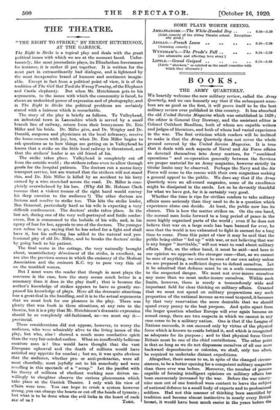THE THEATRE.
"THE RIGHT TO STRIKE," BY ERNEST HUTCHINSON, AT THE GARRICK.
The Right to Strike is a topical play and deals with the great political issues with which we are at the moment faced. Unfor- tunately, like most journalistic plays, its Elizabethan forerunners for instance, it is rather ill put together. It is written for the most part in extraordinarily bad dialogue, and is lightened by the most inexpensive brand of humour and sentiment imagin- able. Except in fact from a political point of view, it is of the tradition of The Girl that Took the Wrong Turning, of the Elephant and Castle elephanty. But when Mr. Hutchinson gets to his arguments, to the issues with which the community is faced, he shows an undoubted power of expression and of photography, and in The Right to Strike the political problems are certainly stated with a fairness which is remarkable.
The story of the play is briefly as follows. To Valleyhead, an industrial town in Lancashire which is served by a small branch line of railway, return from their honeymoon Dr. Eric Miller and his bride. Dr. Miller pere, and Dr. Wrigley and Dr. Donald, surgeons and physicians at the local infirmary, receive the home-comers with joy, but, when Dr. Eric Miller begins to ask questions as to how things are getting on in Valleyhead he learns that a strike on the little local railway is threatened, and that the strikers' leader is an old friend of his.
The strike takes place. Valleyhead is completely cut off from the outside world ; the strikers refuse even to allow through goods for the hospital patients. The doctors run a motor-lorry transport service, but are warned that the strikers will not stand this, and Dr. Eric Miller is killed by an accident to his lorry caused by a wire stretched across the road. Dr. Miller is com- pletely overwhelmed by his loss. (Why did Mr. Holman Clark assume that a violent tremor of the right hand would convey his deep emotion to the audience ?) The other doctors are furious and resolve to strike too. This bite the strike leader, Ben Ormerod, particularly hard as his wife is expecting a very difficult confinement. The doctors' strike takes place. In the last act, during one of the very well-portrayed and futile confer- ences, Ben is summoned to the bedside of his wife, and, in his agony of fear for her, appeals to one of the doctors. The younger men refuse to go, saying that he has asked for a fight and shall have it, but his suffering has added to the natural and pro- fessional pity of old Dr. Miller, and he breaks the doctors' strike by going back to his patient.
The final scene in the cottage, the very naturally brought about, unsatisfactory denoiiment of the strike, is excellent, as are also the previous scenes in which the emissary of the Medical Association and the eminent K.C. try to pour very thin oil on the troubled waters.
But I must warn the reader that though in most plays the converse is the case, here the story seems much better in a summary than it does in the play itself ; that is because the author's knowledge of strikes appears to have so greatly sur- passed his knowledge of plays. Here all the dramatic situations lose a great deal in the handling, and it is to the actual arguments that we must look for our pleasure in the play. There was plenty that was fresh in these situations, at any rate to the theatre, but it is a pity that Mr. Hutchinson's dramatic expression should be so completely old-fashioned, so—we must say it— provincial.
These considerations did not appear, however, to worry the audience, who were admirably alive to the living issues of the play, but who, alas! showed a much more combative spirit than the very fair-minded author. What an insufferably bellicose creature man is ! One moiild have thought that the vast European upheaval and the death of millions would have satisfied any appetite for combat ; but no, it was quite obvious that the audience, whether pro- or anti-proletarian, were all most cheerfully, most joyfully out to hit somebody and were revelling in this spectacle of a "scrap." Let the pacifist with Iris theory of millions of obedient working men driven un- willingly to slaughter observe the curious phenomena which take place at the Garrick Theatre. I only wish his view of affairs were true. You can hope to crush a system however strong, you can change the hearts or cut off the heads of tyrants ; but what is to be done when the evil lurks in the heart of each






































 Previous page
Previous page